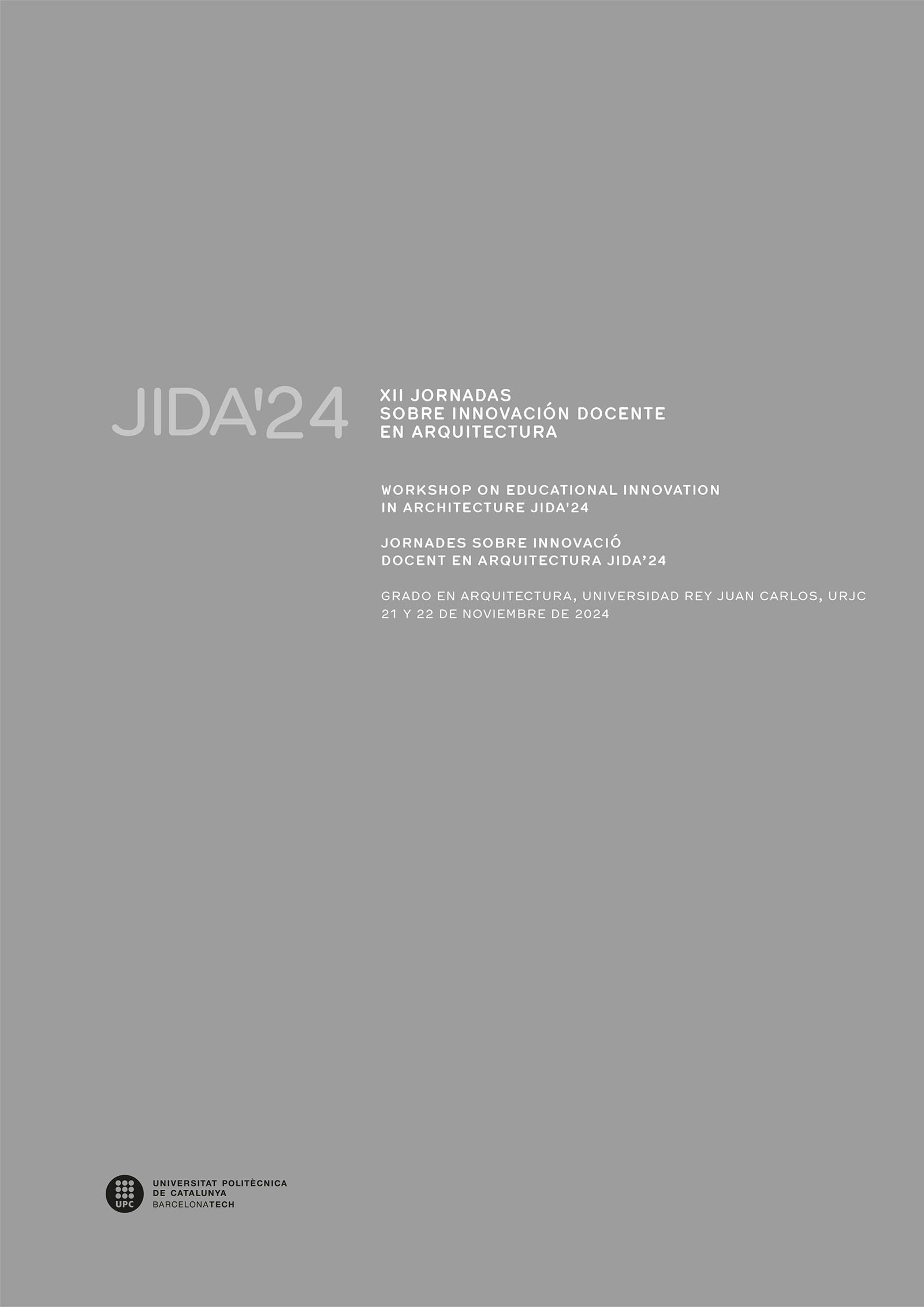Introduction of artificial intelligence for the assessment of theory and history subjects
DOI:
https://doi.org/10.5821/jida.2024.13259Keywords:
architecture, artificial intelligence (AI), chatGPT, criticism, artificial hallucinationsAbstract
The emergence of ChatGPT and other generative Artificial Intelligence tools has raised concerns about their integration into the educational system, highlighting their potentialities as well as their risks and threats. Among the latter, the production of document falsification known as AI hallucination stands out. This communication explores mechanisms for introducing AI in the teaching of architectural theory and history through a specific approach: an assessment designed using ChatGPT in which response errors or hallucinations are induced to enhance students' critical thinking. The goal is to sensitize students to the potential for error without restricting the use of the tool, while simultaneously testing the knowledge acquired. To achieve this, fostering doubt as a critical engine and revaluing historical or primary documentary sources as a final verification mechanism will be crucial.
References
Ahmad, Zakia, Wahid Kaiser y Sifatur Rahim. 2023. «Hallucinations in ChatGPT: An Unreliable Tool for Learning». Rupkatha Journal on Interdisciplinary Studies in Humanities, 15(4). doi: https://doi.org/10.21659/rupkatha.v15n4.17
Athaluri, Sai Anirudh, Sandeep Manthena, Krishna Kesapragada, Vineel Yarlagadda, Tirth Dave y Rama Duddumpudi. 2023. «Exploring the Boundaries of Reality: Investigating the Phenomenon of Artificial Intelligence Hallucination in Scientific Writing Through ChatGPT References». Cureus, 15(4):e37432. doi: 10.7759/cureus.37432.
Bhattacharyya, Mehul, Valerie Miller, Debjani Bhattacharyya y Larry Miller. 2023. «High Rates of Fabricated and Inaccurate References in ChatGPT-Generated Medical Content». Cureus, 15(5). doi: 10.7759/cureus.39238.
Bobula, Michal. 2024. «Generative Artificial Intelligence (AI) in Higher Education: A Comprehensive Review of Challenges, Opportunities, and Implications». Journal of Learning Development in Higher Education, 30. doi: https://doi.org/10.47408/jldhe.vi30.1137.
Bucol, Junifer Leal y Napattanissa Sangkawong. 2024. «Exploring ChatGPT as a Writing Assessment Tool». Innovations in Education and Teaching International, 1–16. doi:10.1080/14703297.2024.2363901.
Çalışkan, Ekrem Bahadır. 2023. «Exam Preparation With Artificial Intelligence: Examination for Building Material Course With Chat GPT». En 3rd International Conference on Innovative Academic Studies, 514-19. https://doi.org/10.59287/icias.1581.
Celik, Ismail. 2023. «Towards Intelligent-TPACK: An empirical study on teachers’ professional knowledge to ethically integrate artificial intelligence (AI)-based tools into education». Computers in Human Behavior, Vol 138. doi: https://doi.org/10.1016/j.chb.2022.107468
Emsley, Robin. 2023. «ChatGPT: these are not hallucinations – they’re fabrications and falsifications». Schizophrenia, 9 (52). doi: https://doi.org/10.1038/s41537-023-00379-4
ETSAV. 2024a. «Guia docent Composició IV». Accedido 26 de julio de 2024. https://www.upc.edu/content/grau/guiadocent/pdf/cat/290640
ETSAV. 2024b. «Guia docent Composició V». Accedido 26 de julio de 2024. https://www.upc.edu/content/grau/guiadocent/pdf/cat/290644
Fergus, Suzanne, Michelle Botha y Mehrnoosh Ostovar. 2023. «Evaluating Academic Answers Generated Using ChatGPT». Journal of Chemical Education, 100 (4), 1672-1675. doi: 10.1021/acs.jchemed.3c00087
Goddard, Jerome. 2023. «Hallucinations in ChatGPT: A Cautionary Tale for Biomedical Researchers». The American journal of medicine, 136(11). doi: 10.1016/j.amjmed.2023.06.012Grané, Mariona. 2024. «Implementación de ChatGPT en el Aula». En ChatGPT y educación universitaria: posibilidades y límites de ChatGPT como herramienta docente, editado por Mireia Ribera y Oliver Díaz, 97-121. Barcelona: Universitat de Barcelona; Ediciones Octaedro. doi: http://doi.org/10.36006/15224-1
Kindenberg, Björn. 2024. «ChatGPT-Generated and Student-Written Historical Narratives: A Comparative Analysis». Education Sciences, 14, (n.º 5): 530. doi: https://doi.org/10.3390/educsci14050530
Leaver, Tama y Suzanne Srdarov. 2023. «ChatGPT Isn’t Magic: The Hype and Hypocrisy of Generative Artificial Intelligence (AI) Rhetoric». M/C Journal, 26 (5). doi: https://doi.org/10.5204/mcj.3004.
Leiser, Florian, Sven Eckhardt, Valentin Leuthe, Merlin Knaeble, Alexander Mädche, Gerhard Schwabe y Ali Sunyaev. 2024. «HILL: A Hallucination Identifier for Large Language Models». En Proceedings of the CHI Conference on Human Factors in Computing Systems (CHI '24). Association for Computing Machinery, (New York, NY, USA), Article 482, 1–13. doi: https://doi.org/10.1145/3613904.3642428
Naciones Unidas. 2023. «Objetivo 4. Educación de Calidad». En Informe de los Objetivos de Desarrollo Sostenible. Accedido 25 de julio de 2024. https://www.un.org/sustainabledevelopment/es/education/
Rahman, Md. Mostafizer y Yutaka Watanobe. 2023. «ChatGPT for Education and Research: Opportunities, Threats, and Strategies». Applied Sciences 13, (n.º 9): 5783. doi: https://doi.org/10.3390/app13095783
Ribera, Mireia y y Oliver Díaz. 2024. «Introducción». En ChatGPT y educación universitaria : posibilidades y límites de ChatGPT como herramienta docente, editado por Mireia Ribera y Oliver Díaz, 7-20. Barcelona: Universitat de Barcelona; Ediciones Octaedro. doi: http://doi.org/10.36006/15224-1
Rodriguez-Echeverría, Roberto, Juan Gutiérrez, José Conejero y Álvaro Prieto. 2024. «Analysis of ChatGPT Performance in Computer Engineering Exams». IEEE Revista Iberoamericana de Tecnologias del Aprendizaje, vol. 19, 71-80. doi: 10.1109/RITA.2024.3381842.
Rowe, Colin y Robert Slutzky. 1963. «Transparency: Literal and Phenomenal». Perspecta 8, 45-54.
Salleh, Hamidah M. 2023. «Errors of commission and omission in artificial intelligence: contextual biases and voids of ChatGPT as a research assistant». Digital Economy and Sustainable Development, 1 (14). doi: https://doi.org/10.1007/s44265-023-00015-0
Su, Jiahong y Weipeng Yang. 2023. «Unlocking the Power of ChatGPT: A Framework for Applying Generative AI in Education». ECNU Review of Education, 6(3), 355-366. doi: https://doi.org/10.1177/20965311231168423
Tossell, Chad C., Nathan L. Tenhundfeld, Ali Momen, Katrina Cooley y Ewart J. de Visser. 2024. «Student Perceptions of ChatGPT Use in a College Essay Assignment: Implications for Learning, Grading, and Trust in Artificial Intelligence». IEEE Transactions on Learning Technologies, vol. 17, 1069-1081. doi: 10.1109/TLT.2024.3355015.
Ülkü, Abdullah. 2023. «Artificial intelligence-based large language models and integrity of exams and assignments in higher education: the case of tourism courses». Tourism & Management Studies, 19(4), 21-34. doi: https://doi.org/10.18089/tms.2023.190402
UNESCO. 2019. «Consenso de Beijing sobre la inteligencia artificial y la educación». Accedido 24 de julio de 2024. https://unesdoc.unesco.org/ark:/48223/pf0000368303
Venturi, Robert. 1966. Complexity and Contradiction in Architecture. New York: The Museum of Modern Art Press.
Walters, William H. y Esther Isabelle Wilder. 2023. «Fabrication and errors in the bibliographic citations generated by ChatGPT». Scientific Reports, 13. doi: https://doi.org/10.1038/s41598-023-41032-5
Zuckerman, Matthew, Ryan Flood, Rachael J. B. Tan, Nicole Kelp, David J. Ecker, Jonathan Menke y Tai Lockspeiser. 2023. «ChatGPT for Assessment Writing». Medical Teacher, 45 (11): 1224–27. doi:10.1080/0142159X.2023.2249239.






















